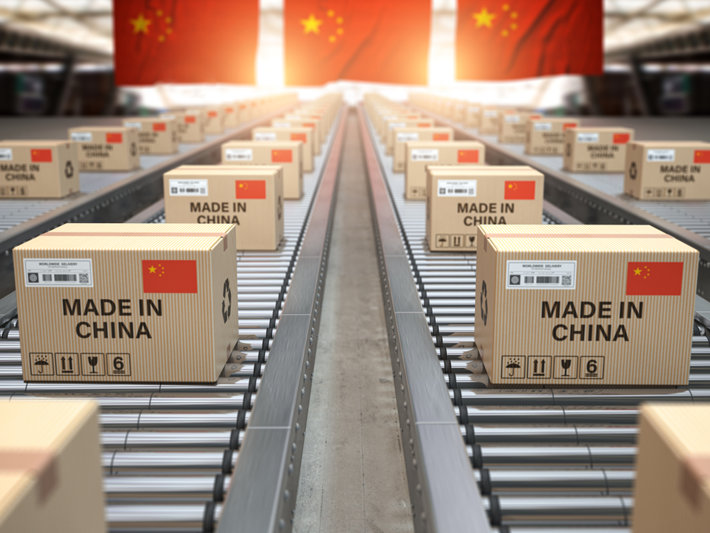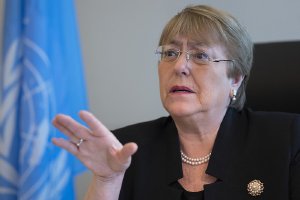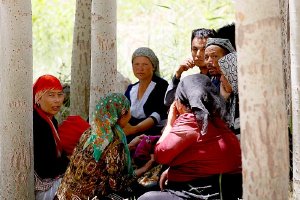In December 2021, with the Olympics on the horizon, the United States Senate approved a bill banning imports from China’s Xinjiang province unless U.S. business can prove forced labor was not used to produce the goods in the northwestern region that is home to the oppressed minority Muslim Uyghur community.

The December 16 bill, approved days earlier with overwhelming bipartisan support in Congress, is the latest in a string of escalating U.S. actions over what independent experts and journalists widely agree is China’s extensive and systematic human rights abuse of religious minorities in the country’s western region, especially in Xinjiang.
The Biden administration also announced new sanctions on December 16 against several Chinese biotech firms, surveillance companies, a leading manufacturer of drones, and Chinese government entities for their actions in Xinjiang.
On December 10, the U.S. Department of the Treasury imposed sanctions against two Chinese officials accused of playing a direct role in the surveillance, mass detention and forced labor of Uyghurs and other Muslim minorities of Turkic origin in Xinjiang.
In its 2021 annual report, the United States Commission on International Religious Freedom (USCIRF), an independent, bipartisan arm of the U.S. State Department, noted that since 2017, Chinese authorities have reportedly confined millions of Muslims in internment camps in Xinjiang for “wearing long beards, refusing alcohol, or exhibiting other behaviors deemed signs of ‘religious extremism.’”
Reports of torture, rape, sterilization and other abuses in the detention centers and forced labor in factories and industrial parks have raised fears that China’s actions in Xinjiang could rise to the level of genocide under international law. Added to this are “large-scale closures and destruction of Uyghur religious sites, including mosques and shrines important to that community’s religious, ethnic, and cultural identity.”
China denies committing any abuses in Xinjiang but asserts its actions are necessary to counter terrorism and contain a separatist movement in the region.
The U.S. has accused China of using the forced labor of Uyghur detainees to produce goods ranging from raw cotton, gloves and tomato products to silicon and viscose, fishing gear and solar energy components. The U.S. also says that the laborers are sent outside resource-rich Xinjiang, where they are forced to work in factories, most notably in the textiles, apparel, electronic, solar energy and automotive sectors.
“Many companies have already taken steps to clean up their supply chains,” Senator Marco Rubio, who coauthored an earlier version of the legislation, said in a statement. “For those who have not done that, they’ll no longer be able to continue to make Americans—every one of us, frankly—unwitting accomplices in the atrocities, in the genocide.”
The legislation and sanctions show that “the United States is way ahead” of the rest of the world in holding China accountable for the human rights abuses of Uyghurs, said Nury Turkel, a fellow at the Hudson Institute and USCIRF vice chair.
A longtime activist for Uyghur rights, Turkel, an Uyghur, is the first member of the minority community to be appointed as a USCIRF commissioner.
On December 21, China announced sanctions on Turkel and three other USCIRF members in retaliation for the U.S. ban on imports from Xinjiang.
_______________
From its beginnings, the Church of Scientology has recognized that freedom of religion is a fundamental human right. In a world where conflicts are often traceable to intolerance of others’ religious beliefs and practices, the Church has, for more than 50 years, made the preservation of religious liberty an overriding concern.
The Church publishes this blog to help create a better understanding of the freedom of religion and belief and provide news on religious freedom and issues affecting this freedom around the world.
The Founder of the Scientology religion is L. Ron Hubbard and Mr. David Miscavige is the religion’s ecclesiastical leader.
For more information visit the Scientology website or Scientology Network.


